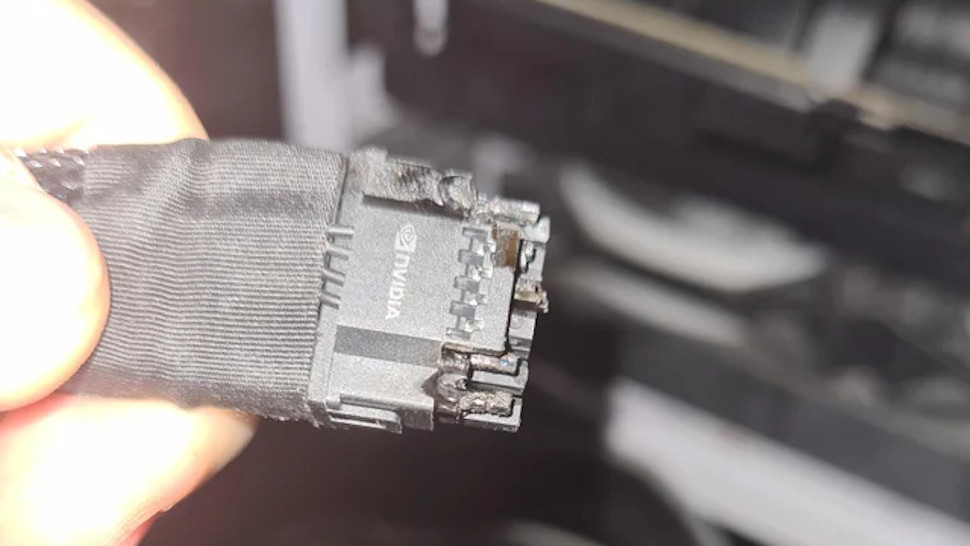Nvidia is looking into reported issues with RTX 4090 GPU melting cable
Burnt out adapter cable in two reported cases

Nvidia’s RTX 4090 could have a problem its cable melting, at least according to a couple of reports from buyers, issues which Team Green is currently investigating.
As Tom’s Hardware flagged up, a Gigabyte RTX 4090 owner wrote about this problem on Reddit, and that post was followed by another user who had encountered the same worrying flaw.
Specifically, this is the adapter cable being burnt – the one provided with the RTX 4090 to allow connection to an ATX 2.0 PSU (4 x 8-pin to 16-pin) – and the first Redditor provided photographic evidence showing that it’d been rather toasted indeed (see above).
The other RTX 4090 buyer (this time with an Asus TUF Gaming OC card) then chimed in: “You aren’t the only one. This happened to me today as well, not as badly burned as yours though. I was having a gaming session few hours ago, playing Black Desert with my dungeon party. All the sudden the screen went black and all the fans started spinning at 100%. Powered off the machine and after some inspection noticed that the power adapter was damaged.”
Nvidia told Tom’s Hardware: “We are investigating the reports. We are in contact with the first owner and will be reaching out to the other for additional information.”
Analysis: The 35mm rule and safe seating of connectors
At the moment these appear to be the only two instances of this melting issue reported, as we can’t see any other complaints on Reddit (or elsewhere online for that matter).
So, there’s always the possibility that these folks got really unlucky with their graphics cards somehow, or there was something wrong with their setup, or the way the cable was installed.
Get daily insight, inspiration and deals in your inbox
Sign up for breaking news, reviews, opinion, top tech deals, and more.
What most folks are currently concerned about is the way in which the adapter is installed, as this has been problematic in terms of the adapter cable being very stiff and troublesome to bend round in order to fit it, while still being able to put the side panel back on the PC case.
Indeed, the worry aired by many here is that if the cable is bent round at a sharp angle to fit, this could pull on the pins, and the connector won’t be properly seated in the 4090 graphics card – and this isn’t safe, especially with the amount of power chugging through those cables (450W, maybe more with overclocking and such). Could this be the reason for these melted adapters? We simply don’t know for sure, of course, but it seems like the most likely culprit at this point.
Nvidia’s investigations will doubtless throw more light on the matter, although some people have already criticized the design of the adapter for ATX 2.0 power supplies, and are now questioning why it didn’t come with a right-angled connector to avoid bending the cable – which officially is not supposed to be bent any closer than 35mm from the connector on the end. There is a third-party 90-degree angled 16-pin connector coming, mind you, as you may have seen.
For now, though, what worried RTX 4090 owners can do is check the cable connector is firmly seated in the card, and don’t bend the cable within 35mm of the end – leave plenty of room. (Easier said than done with many PC cases, though, unless you’re going to leave the side panel off, which is far from ideal for a number of reasons like dust, potential for damage to the hardware innards, and a noisier PC when all those fans kick in).
Do note that this potential cable melting issue shouldn’t affect folks who have a new ATX 3.0 PSU, which can just use the 16-pin cable to hook up to the RTX 4090 with no need for any adapter. At least in theory those PSUs won’t have any problems, anyway.
Let’s hope Nvidia clears this matter up, and confirms what happened in these two cases, sooner rather than later, so we can know what’s up for sure.
Darren is a freelancer writing news and features for TechRadar (and occasionally T3) across a broad range of computing topics including CPUs, GPUs, various other hardware, VPNs, antivirus and more. He has written about tech for the best part of three decades, and writes books in his spare time (his debut novel - 'I Know What You Did Last Supper' - was published by Hachette UK in 2013).